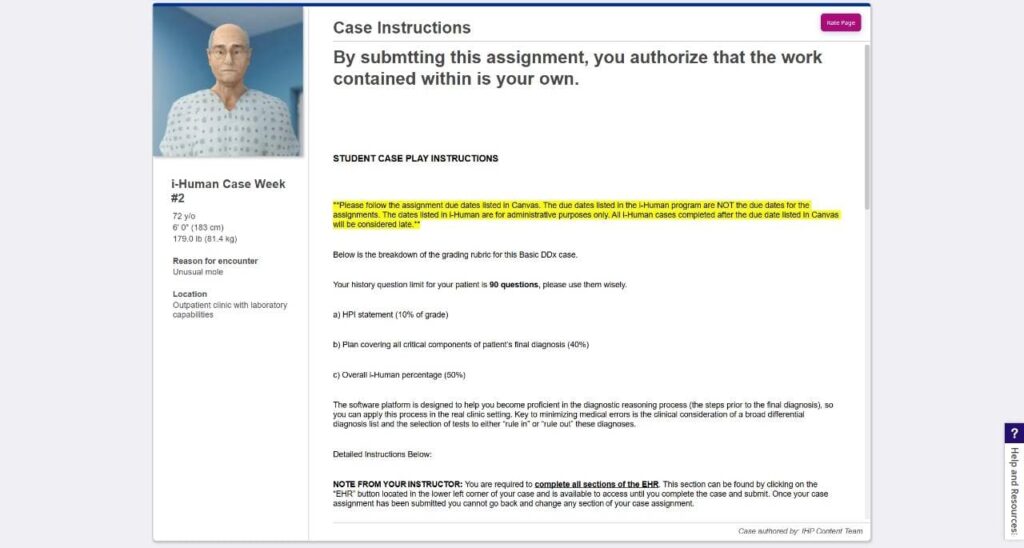6531 iHuman Week 2 Unusual mole
History of Present Illness (HPI)
A 72 year old male with a history of hypertension, hyperlipidemia, osteoarthritis (hands), COPD and 80 pack year former history of smoking presents today for evaluation of an unusual mole he first noticed 3-4 months ago on his right shoulder. Although the mole has maintained the same dark brown color and asymmetric shape since he noticed it, its edges have become more irregular. He describes it as itchy, painless, scaly, and hangs on his shirts. He is a third generation farmer and has been farming corn, soybeans, sweet potatoes and tobacco all his life. He recently retired and let his son-in-law take over but occasionally helps them. He acknowledges having sunburns from prolonged sun exposure as a farmer. He denies fevers, intentional/unintentional weight loss, night sweats, swelling in any part of the body, easy bruising/bleeding. He has a COPD cough.
Physical Exam
- Cognitive status
- Pulse
- Inspect skin overall
- Auscultate lungs
- Auscultate heart
Case Findings
- Dull, waxy, dark brown, uniform in color
- Asymmetric, irregular borders
- <6mm in size
- Rough, raised scaly to palpation catches on clothing
- Fitzpatrick II skin type, multiple other freckles
- Dermatoscopy fissures, ridges, comedo-like openings
- Prolonged sun exposure, frequent sunburns(occupation)
- 80 pack-year smoking history(habits)

Problem Statement
The patient is a 72-year old male who presents today for evaluation of an unusual skin lesion on his right shoulder that he noticed 3-4 months ago. He informs that the lesion has gradually changed to have irregular asymmetric borders, scaly, and dark brown and now gets caught on his clothing. He is a retired third generation farmer and acknowledges prolonged sun exposure and sunburns over the years as a farmer. Social history is significant for 80 pack years of tobacco smoking. PMH is significant for allergies (hay fever), osteoarthritis (hands), hypertension, and high cholesterol. Family history is significant for lung cancer (father). He however denies weight loss, bleeding, purulent discharge, fever, night sweats, or bleeding. Physical exam demonstrates a dull waxy, dark brown skin lesion on right shoulder 4mm in size. It is rough, raised, scaly with irregular borders to palpation. He has a Fitzpatrick II skin type and dermatoscopy reveals fissures, ridges, with comedo-like openings.
Primary Diagnosis
Seborrheic keratosis, unspecified ICD10-L82.9 – is a benign skin lesion with a wart-like appearance that affects all races and commonly appears after the age of 40 years (Sun & Halpern, 2022). Its color ranges from black to white but the majority are brown or tan. Although they can be found anywhere on the skin, rarely on the soles and palms and are non-contagious. It often starts as small round bumps and gradually thicken to a waxy, brown stuck-on-the-skin appearance (American Academy of Dermatology, 2023). They can cause some mild itching but are painless. Although its exact cause remains unknown, genetics (family history of seborrheic keratosis), prolonged exposure to the sun, and aging play a critical role (American Academy of Dermatology, 2023). The 72 year old patient in this case reports a history of sunburns and prolonged sun exposure as a third generation farmer and has an advanced age which are potential risk factors. Besides physical exam demonstrates a Fitzpatrick II skin type with a 4mm dark brown, dull waxy, scaly, asymmetric skin lesion on the right shoulder with irregular borders.
Management Plan Feedback
Pharmacologic care
- Continue with previous medications as prescribed
Supportive Care
- Referral to dermatology placed for skin biopsy. Keep skin lesion clean, dry, and covered with a bandage
- Continue use of sunscreen, 50 SPF or more, hats, and sun-protective clothing, and increase use in summer months.
- Consider gardening in the early morning or evening, and doing indoor activities between 10am and 2 pm when the sun is highest
Patient education
- Educated on diagnosis and need for biopsy by dermatology. Stressed the importance of maintaining follow up
- Education provided on benefits of continued smoking cessation, sunscreen and protective clothing use
Follow-up
- Will coordinate a follow up appointment after the dermatology appointment
- Follow-up for well-checks and as needed.




